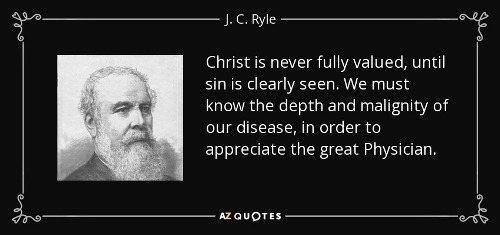Recently I was listening to someone preach. They mentioned in their preaching the reasons why - according to them - Jesus had to come to this earth and die. To my astonishment, among the few reasons they stated, sin was nowhere to be found!!! I know they were not being purposefully deceitful, but it shows how much blindness has come upon the church these days. If there is one thing we should never forget, it is from what utter helplessness and misery the Lord rescued us! The sin of mankind is THE reason why Jesus came into this world and died.
In this is love: not that we loved God, but that He loved us and sent His Son to be the atoning sacrifice for our sins.
(1 John 4:10)
[see also Matthew 1:21; Mark 2:17; Luke 5:32; Hebrews 2:17; Hebrews 9:26; 1 Timothy 1:15; 1 John 3:5.]
Shh! Do Not Talk About Sin!
Unfortunately, by and large in the church today we rarely hear the word "sin" any more. It is a word that preachers and pastors shy away from in the fear of offending their congregations. Or if they do risk using this taboo word, they feel the need to quickly apologize afterwards, as if they had just been out of line.
It seems like they need to appease their audience and reassure them that surely that word "sin" could be in no way connected with them; and there are absolutely no reason why they should even begin to consider the possibility of any sin existing in their life.
Hmmm!... Could this be the fear of man that the Bible talks about? (see Proverbs 29:25) It is so rare nowadays to come accross a Christian minister who truly has the fear of the Lord. When this is the case, this preacher is not fearful to use the word "sin" and even call out specific sins as the Holy Spirit leads.
This is not about bashing or condemning people, but allowing the Holy Spirit to do His work of convicting people of sin, righteousness and judgment (see John 16:8). In His love, the Holy Spirit wants to convict people of their sins. It is God's goodness that brings us to repentance. But if because of fear we choose not to offend anyone, people will remain in their sins and will not turn away from them.
This is how it is possible for so many people to attend church services for years while leaving a life totally contrary to the Gospel, without ever thinking twice and without ever feeling uncomfortable about it; because they are never confronted to their sinfulness. People that have grown up in the church may die in their sins, because they did not hear about the one thing that separates us from God - sin. This is unbelievable, but sadly true!
If we do not hear about sin in the church, where else would we hear about it? People need to know that we have all sinned (see Romans 3:23); not even one person is a good person according to God's standards (which are much higher than ours). We have all transgressed His commandments as we have all - at least once - acted in a way that wasn't loving. God expects nothing less than a life of perfect love for Himself and our neighbours. Coming short of this is evil and is sin, and unfortunately to be just and fair, God will have to punish sin. He cannot decide that your evil or my evil is less evil than another person's evil. It is all the same; it is all sin to a perfect God.
However, today many preachers have become motivational speakers; they encourage us. They like to preach about how much God loves us and cares for us, how much He desires to comfort us when we go through hardship and pain, how much He understands our struggles and is there for us. This is all true. Our God is good, He loves us and comforts us. But this is not the whole truth. And even a truth like this can become a lie if the rest of the truth remains hidden.
Building Up An Idol
When God is consistently defined as a God of love, but never as a righteous God of holiness, something is missing and we are misrepresenting Him. This will eventually prevent people from knowing Him for who He really is and encourage them to create a god in their minds who is not the God of Scripture. In other words, they will make up an idol - a god who loves them and never rebukes them, a god who constantly forgives them and does not demand obedience.
This is exactly the kind of "god" that is reflected in many of the popular "Praise and Worship" songs that we hear today (eg. "Reckless Love", "Good Good Father", and many more...). The lyrics in these songs are so vague, they do not clearly explain who Jesus is or what He has done. WE have become the focus of attention and God has become a god that begs for us to come to him. His sole desire is to please us and spoil us, like a Father Christmas... This god is a weak god that needs us so much and would do everything in his power to make us happy and provide good feelings. It almost feels asif it is God worshipping us instead of us worshipping Him! It is a complete turn around from what most older songs and hymns expressed - God in His beauty and majesty used to be the focus of our admiration and we used to be in desperate need of Him!
Have we created a god in our own image? Who do we actually worship?
We need to be careful to embrace the full nature of God as revealed in Scripture. Let us allow Him to reveal to us who He is through His Word, without our preconceived ideas - of who he should be or who we would like Him to be. Yes, God is love and this is wonderful news. But He is also holy and righteous, and He cannot tolerate sin. Emphasizing either side of God to the detriment of the other is wrong and misleading (see also The 2 Sides of God).
Remember the Israelites and the golden calf? Seeing that Moses was spending too long on the mountain, they became impatient and started to build and worship a different god. Although it was an idol, they called it by God's real name, "Yahweh" or "the Lord", and declared that this god was the one who rescued them from Egypt (see Exodus 32:3-5).
Do you realise what they did? They fashioned their own god and then credited it with God's name and salvation abilities. This "god" had the right name; it was a god who loved them and saved them from bondage, but not a god to be obeyed and feared.
God had just made a covenant with them stipulating that they were not to worship any other god, and they had readily accepted. But they quickly forgot and the first thing they did was to worship another god. The God who led them out of Egypt was suddenly not good enough for them! They needed a god that they could see and touch. And above all, they needed a god that they could control: not one that they should submit to, but one that would do their bidding. They refused to embrace the fact that God was holy, unapprochable and actually quite scary! This is not the God they wanted. This is not the one they had pictured in their minds. A "little" god, who would not demand so much from them and who would let them enjoy themselves, was much better...
But our God is not a "little" God that we can play with. Either we worship Him for the fullness of who He really is, or we do not worship Him at all! We cannot accept part of Him and reject the rest. This is idolatry.
Is Sin Really An Issue?
The Bible says that "if we say that we have not sinned, we make Him [God] a liar and His word is not in us." (1 John 1:10). Turning a blind eye on sin and ignoring the fact that God does not tolerate it, is just the same as saying that we have not sinned. When we do not talk about it and do not deal with it, sin simply does not exist.
If we do not want to say that "we have not sinned" then we must say that "we have sinned", acknowledge it and call it for what it is. Then God is able to open our eyes and point specific sins to us in a process called sanctification. This is the process by which, in His grace, He saves us from the power sin has on us.
Ultimately, this is what salvation is all about: sin and the Saviour. We are sinful beings and Jesus Christ saves us from our sins (the name Jesus or Yeshua means "Saviour"). From the time we are born again, He has already saved us from the penalty or punishment of sin (this is justification - past tense); He is saving us from the power of sin (this is sanctification - present tense) and at His return He will save us from the presence of sin (this is glorification - future tense). In Jesus, God definitely deals fully and thoroughly with sin.
By being so silent on this issue of sin, the church is ignoring the very thing for which Jesus came and died to save us from. Our Saviour came to deliver us, to save us from our sins. But how can people be delivered of a problem they do not even know that they have? How can they be saved from an issue that does not exist? No issue of sin means no need for a Saviour. It is high time to break the silence.


